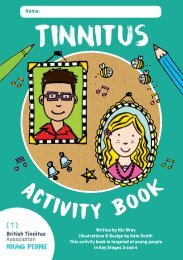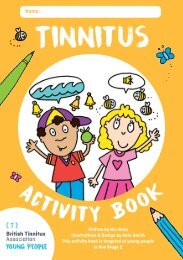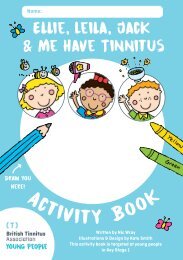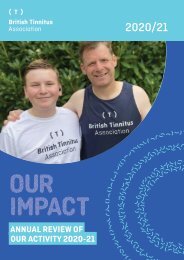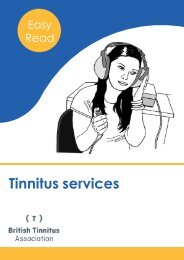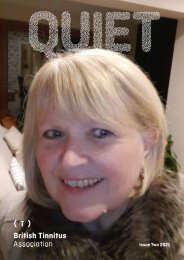Our Impact 2020/21
Annual review of our activity 2020/21.
Annual review of our activity 2020/21.
You also want an ePaper? Increase the reach of your titles
YUMPU automatically turns print PDFs into web optimized ePapers that Google loves.
<strong>2020</strong>/<strong>21</strong><br />
OUR<br />
IMPACT<br />
ANNUAL REVIEW OF<br />
OUR ACTIVITY <strong>2020</strong>-<strong>21</strong>
<strong>2020</strong>-<strong>21</strong><br />
IN NUMBERS<br />
238,800<br />
views of our videos<br />
on YouTube during the year, compared to<br />
40,500 the previous year.<br />
14,343<br />
calls, web chats,<br />
emails, and texts<br />
answered by our Tinnitus Support<br />
Team: 47% more than last year.<br />
1.7 MILLION<br />
people benefitted<br />
from accessing our support and information services.<br />
A huge increase of 29% compared to last year.<br />
£280,000<br />
invested in<br />
tinnitus research<br />
– the highest amount we have ever<br />
given, making us one of the largest<br />
tinnitus research funders worldwide.<br />
£13.71<br />
created<br />
in social value for every £1 we spend.
3.6 MILLION<br />
page views<br />
of our tinnitus information online,<br />
compared to 2.7 million last year.<br />
18,712<br />
subscribers<br />
to our e-newsletter,<br />
compared to 4,804 last year.<br />
£1.28<br />
MILLION<br />
raised by our<br />
incredible<br />
supporters<br />
allowing us to support people with<br />
tinnitus and invest in research.<br />
1.4<br />
MILLION<br />
people saw<br />
our Tinnitus Week<br />
#ThisIsMySilence campaign,<br />
raising essential awareness.<br />
1 Department<br />
of Health<br />
and Social Care<br />
working group<br />
established to address research<br />
capacity and funding for tinnitus<br />
and hearing loss.
WHY<br />
WE<br />
EXIST<br />
1 in 8 people in the<br />
UK have tinnitus, yet<br />
the condition is often<br />
overlooked and dismissed<br />
by many.<br />
For those most affected, tinnitus can be<br />
overwhelming and leave them struggling with<br />
day-to-day life. To everyone living with tinnitus,<br />
our message is clear: your struggle is our cause.<br />
As a research-led charity, the British Tinnitus<br />
Association (BTA) empowers the global scientific<br />
community to help understand tinnitus better,<br />
discover new ways to treat it and ultimately<br />
find a cure.<br />
We provide a range of services backed up by the<br />
most up-to-date research – including support<br />
groups, a helpline, and our website – created<br />
specifically to help people with tinnitus to manage<br />
their condition and lead more fulfilling lives.<br />
We work with medical professionals to ensure<br />
people with tinnitus get the right information and<br />
advice. We also build awareness with government<br />
bodies and the general public to raise funds and<br />
provide support.<br />
04<br />
We want a world where no one suffers<br />
from tinnitus.
The year that everything changed<br />
We began the new financial year in a state of<br />
uncertainty, adapting to a new way of working<br />
as we all came to terms with the impact of the<br />
global coronavirus pandemic and the reality of a<br />
national lockdown. It was impossible to anticipate<br />
then that over a year, and two more lockdowns<br />
later, we would all still be living this ‘new normal’.<br />
Despite this, last year we helped 1.7 million<br />
people living with tinnitus through our information<br />
and support services. That’s a huge 400,000<br />
more people than the previous year. This vital<br />
work has all been made possible thanks to our<br />
amazing supporters, who raised £1.28 million<br />
in the year.<br />
At the same time as being there for those that<br />
needed us, we have pressed ahead with passion<br />
in our mission to drive progress towards a cure.<br />
We made a renewed commitment during the year<br />
to establishing a tinnitus biobank to help us move<br />
closer to this goal. And, as a result of generous<br />
legacy donations, we have invested £280,000<br />
in research that will improve our understanding<br />
of tinnitus.<br />
I am incredibly proud of what we achieved<br />
together over the last year. However, the number<br />
of people living with tinnitus in the UK is set to rise<br />
by more than half a million people by 2028 and<br />
with tinnitus being recognised as a side effect<br />
of Covid-19 and long Covid, our support services<br />
and dedication to researching tinnitus cures have<br />
never been more vital. Together, I hope we will<br />
achieve even more in 20<strong>21</strong>-22 and beyond.<br />
David Stockdale<br />
Chief Executive<br />
05
CHRISTINA’S<br />
STORY<br />
Christina Kennedy,<br />
41, from Daventry, first<br />
developed tinnitus in<br />
August 2019 after an<br />
ear infection that left<br />
her struggling to hear.<br />
Over the course of a<br />
few weeks her tinnitus<br />
got worse and worse<br />
until the ringing in her<br />
ears was all she<br />
could hear.<br />
06
The mum-of-one saw several GPs over a threeweek<br />
period and tried antibiotics, sleeping tablets<br />
and nasal sprays, while some doctors just said<br />
to ignore it. Nothing worked though and, feeling<br />
increasingly helpless, she Googled ‘tinnitus’,<br />
which led to her reading a number of alarming<br />
articles stating that there is no cure.<br />
“By this point it started to feel that this tinnitus<br />
sound, which was completely new to me at that<br />
point, was going to be with me forever and there<br />
would be nothing that I could do about it. I began<br />
to feel extremely distressed, and I couldn’t eat for<br />
worrying – which led to me losing weight – and<br />
I couldn’t sleep either. In fact, I was scared to<br />
lay in bed and scared to get up – I just couldn’t<br />
escape the sound. It all started to spiral. I just felt<br />
like a different person and couldn’t see a way out.<br />
I didn’t want to live anymore, and I was afraid of<br />
how I was thinking.”<br />
After the panic attack Christina knew that she<br />
had to look at her tinnitus differently and asked<br />
for an appointment with a doctor to discuss her<br />
mental health. The way the GP approached her<br />
condition changed everything for her:<br />
“This doctor stopped, listened and then<br />
educated me – all in the space of a 20-minute<br />
appointment. For me, talking through the mental<br />
health challenges I’d been experiencing and<br />
having them validated by a health professional<br />
took a weight off my shoulders. She explained<br />
what tinnitus is and we talked about different<br />
management strategies. For the first time I could<br />
see light at the end of the tunnel.<br />
“I had a really helpful call with someone on the<br />
British Tinnitus Association helpline and joined a<br />
local tinnitus support group, where I learned why<br />
the brain reacts the way it does and how other<br />
people cope with their tinnitus. It was like putting<br />
a jigsaw together and, once I understood it, life<br />
just got a lot better.<br />
“I have since discovered that I suffer from<br />
high-frequency hearing loss and so I now have<br />
a hearing aid, which helps. I also found that<br />
meditation – something I never would have<br />
considered before – improves things as stress<br />
and anxiety are major triggers for tinnitus.<br />
“Tinnitus is a really misunderstood condition<br />
and it’s not taken as seriously as it should be.<br />
The fact that it’s invisible makes it hard for<br />
people to understand and that can make dealing<br />
with it quite a lonely experience. I definitely think<br />
my healthcare journey could have been a lot<br />
better but it really improved once I addressed the<br />
mental health concerns of tinnitus.<br />
“I would advise anyone who is struggling<br />
with tinnitus right now to access support as<br />
early as possible and to ensure they share the<br />
mental health challenges right from the first<br />
appointment. Once I did that, things started<br />
to improve, and I haven’t seen another<br />
doctor since.”<br />
07
WHAT WE’VE<br />
ACHIEVED<br />
INVESTING<br />
IN RESEARCH<br />
“I am so hopeful that we can find a cure for<br />
tinnitus. It would completely transform my life.”<br />
We made a renewed commitment during the year<br />
to establishing a tinnitus biobank – a database<br />
of health information – and planning for this has<br />
begun, including reviewing potential partnership<br />
opportunities and engaging with consultants to<br />
ensure that we are building the biobank from<br />
the best possible foundations.<br />
This year, we invested £280,000<br />
in research projects:<br />
• King’s College London’s study aims to identify<br />
tinnitus biomarkers – or special molecules<br />
– in the blood that could help to predict who<br />
will develop tinnitus.<br />
• Using artificial intelligence, Macquarie University<br />
in Australia aim to objectively determine<br />
whether or not a person has tinnitus through<br />
examining recordings of their brain waves.<br />
08
• Dr William Sedley at Newcastle University’s<br />
project will look at understanding how brain<br />
activity changes during the development of<br />
tinnitus (joint-funded by RNID).<br />
We supported an important study, led by Dr<br />
Eldré Beukes from Anglia Ruskin University,<br />
which explored the experiences of people with<br />
tinnitus worldwide during the Covid-19 pandemic.<br />
Published in November <strong>2020</strong>, it found that nearly<br />
half (46%) of those living with tinnitus in the UK<br />
reported that their condition had been made worse<br />
due to the impact of lockdown and lifestyle changes.<br />
In March 20<strong>21</strong>, we also published the results<br />
of our study – funded by Help Musicians – into<br />
the impact of tinnitus on professional musicians<br />
in the UK.<br />
CAMPAIGNING<br />
FOR CHANGE<br />
In February <strong>2020</strong>, we published our Tinnitus<br />
Manifesto, which calls for three steps the<br />
Government must take to give people with<br />
tinnitus hope for a cure, and an accompanying<br />
petition was signed by 126,201 people. This work<br />
generated the first ever debate on tinnitus in<br />
the House of Lords and a commitment from<br />
the Health Secretary to look at funding for<br />
tinnitus research.<br />
Then, just one month later, the true effect of<br />
Covid-19 became clear and the UK went into<br />
its first lockdown. This changed our immediate<br />
priorities for a short period, but campaigning for<br />
increased funding in tinnitus research was never<br />
far from our minds. As soon as we could, we<br />
worked with Sir John Hayes MP – who has<br />
tinnitus himself – to keep this issue on the<br />
political agenda by engaging with Lord Bethell,<br />
the Under-Secretary of State at the Department<br />
of Health and Social Care.<br />
As a result of this work, in December <strong>2020</strong>, the<br />
Department of Health and Social Care convened<br />
their own roundtable event to discuss issues<br />
relating to research on adult hearing loss and<br />
tinnitus. The event resulted in the creation of a<br />
working group tasked with addressing research<br />
capacity and funding for tinnitus and hearing loss.<br />
09
GIVING THE SUPPORT<br />
THAT PEOPLE NEED<br />
Over the last year, 1.7m people have benefitted<br />
from accessing our support and information<br />
services; a huge increase of 29% compared<br />
to last year.<br />
Due to coronavirus lockdowns and restrictions,<br />
we quickly adapted our services to run remotely<br />
as our staff and volunteers worked from home<br />
throughout the year.<br />
Tinnitus Support Team<br />
“I can't thank you enough for being there.<br />
I was ready to give up.”<br />
<strong>Our</strong> Tinnitus Support Team received 14,343 calls,<br />
web chats, emails, and texts in <strong>2020</strong>/<strong>21</strong>, a 47%<br />
increase on last year.<br />
Support groups<br />
As our 115 support groups around the UK were no<br />
longer able to meet face-to-face, we supported<br />
many to set up online. We launched an additional<br />
10 BTA online support groups, including dedicated<br />
groups for musicians, young people, and those<br />
new to tinnitus support. The BTA online groups<br />
supported 297 individuals, with 97% of attendees<br />
finding their group helpful.<br />
Online events<br />
In the absence of face-to-face events, this year<br />
we have developed a strong programme of<br />
workshops and webinars – covering topics from<br />
getting the most out of your GP consultation<br />
to anxiety management for tinnitus. Attended<br />
by 324 individuals, the 32 online public events<br />
received overwhelming positive feedback, with<br />
96% reporting that they found them helpful.<br />
3,514<br />
new registrations<br />
to Take on Tinnitus,<br />
compared to 1,779<br />
last year<br />
3,<strong>21</strong>4<br />
active users on our<br />
community forum, which<br />
is up 9% on last year’s<br />
2,955 active users.<br />
10
OUR SOCIAL VALUE<br />
As well as monitoring how well the BTA performs<br />
as a charity financially, we also assess our social<br />
return on investment (SROI). SROI is a method<br />
that measures the social value of our services for<br />
our community.<br />
In <strong>2020</strong>, an independent review carried out by<br />
the Social Value Business looked at the value of<br />
our online support groups, support group leader<br />
training, public events, membership, SMS and<br />
web chat support services, volunteer programme<br />
and befriending scheme.<br />
The review found that for every £1 we spend on<br />
delivering services, we create £13.71 in social<br />
value (<strong>2020</strong>: £12.72).<br />
We have identified that our support group leader<br />
training programme is the service that provides<br />
the highest social return on investment – for<br />
every £1 we spend, we create a social value of<br />
£<strong>21</strong>.60. There is a subsequent social value of<br />
£17.55 for every £1 that we invest in our online<br />
support groups.<br />
SUPPORTING<br />
PROFESSIONALS<br />
As well as supporting people affected by tinnitus,<br />
we helped professionals to make sure they could<br />
give their patients the best possible support.<br />
<strong>Our</strong> flagship annual conference was held virtually<br />
in October <strong>2020</strong>. We presented a five-day<br />
programme of learning with leading clinicians<br />
and researchers. The online event allowed us<br />
to reach a wider audience, provide flexible ondemand<br />
viewing for up to 12 months and increase<br />
engagement. The conference was attended by<br />
306 people from 26 countries. 35% had not<br />
attended our conference before.<br />
We launched an Online Journal Club, which offers<br />
audiologists and hearing care professionals a<br />
professional development opportunity to discuss<br />
the latest tinnitus research papers.<br />
And we’ve stayed connected by maintaining<br />
close links with relevant professional<br />
organisations, including industry bodies and<br />
leading research centres.<br />
11
RAISING AWARENESS<br />
OF TINNITUS<br />
Tinnitus is a condition that is misunderstood<br />
by many. It is not commonly talked about,<br />
and the impact it can have on people’s lives<br />
is often trivialised.<br />
Sharing your silence<br />
This Tinnitus Week (1-7 Feb 20<strong>21</strong>), we wanted to<br />
use our annual awareness-raising campaign to<br />
change that and make this ‘hidden condition’<br />
more visible.<br />
And our supporters really helped us to do that!<br />
We were humbled by the amount of people<br />
who supported our #ThisIsMySilence social<br />
media campaign. Hundreds shared a photo and<br />
their own words to explain how tinnitus affects<br />
them – with over 620 social media mentions<br />
for #ThisIsMySilence and an estimated reach<br />
of 1.4m. It was incredibly impactful to read<br />
everyone’s journey with the condition and<br />
heartening to hear how many now live well<br />
with tinnitus.<br />
A few of our fantastic supporters also shared their<br />
stories and expertise with the press – including<br />
BBC One’s Morning Live, The I, The Sun, The Metro<br />
and Yahoo! Style – highlighting the mental health<br />
impact of tinnitus, the need for an improved<br />
tinnitus patient journey and the link between<br />
tinnitus and long Covid.<br />
Giving information people can trust<br />
Over the last year, we gave trustworthy information<br />
to more people affected by tinnitus than ever before.<br />
There were 3.6 million page views of our tinnitus<br />
information online, compared to 2.7 million the<br />
previous year. And, we have significantly grown the<br />
number of people subscribing to our e-newsletter:<br />
from 4,804 in April <strong>2020</strong> to 18,712 in March 20<strong>21</strong>.<br />
We developed new information focusing on the link<br />
between tinnitus and Covid-19, including resources<br />
and advice for people new to tinnitus, and guidance<br />
on the Covid-19 vaccines. We also reviewed 15<br />
tinnitus treatments and provided evidence-based<br />
recommendations for or against these – enabling the<br />
tinnitus community to make informed decisions.<br />
12
PEOPLE WITH TINNITUS<br />
ARE AT THE HEART OF<br />
EVERYTHING WE DO<br />
We engage with our community regularly to<br />
ensure that the decisions we make and the<br />
resources we produce reflect what our<br />
community want.<br />
During the year, we have done this in various<br />
ways, including:<br />
• working with our consultation group – made<br />
up of 83 people affected by tinnitus – on new<br />
information leaflets and developing workshops<br />
for a “Tinnitus and the arts” research project;<br />
Reaching more people with tinnitus<br />
We have made huge strides in recent years, which<br />
we’re very proud of, but we know the BTA must<br />
evolve if we are to reach even more people living<br />
with tinnitus, raise awareness of the condition<br />
and support the highest-quality research.<br />
With this in mind, we have been taking stock of<br />
how we present and talk about ourselves. We<br />
have been consulting our supporters (and people<br />
with tinnitus who have never heard of us) through<br />
interviews, focus groups and surveys to get their<br />
thoughts and opinions to help us to improve our<br />
communications and shape the future of the BTA.<br />
• developing a community call group to support<br />
with assessing how we want to transform<br />
digitally in the future; and<br />
• engaging a lay panel to review the applications<br />
to our large research project programme.<br />
<strong>Our</strong> bi-annual survey received over 2,250<br />
responses and covered topics including the<br />
impact of tinnitus, satisfaction with tinnitus<br />
services, awareness of the BTA’s research<br />
and support, and what our focus should be<br />
in the future.<br />
13
YOU ARE<br />
AMAZING!<br />
The generosity of our supporters and donors drives<br />
everything that we do. We’re delighted to share some<br />
of our fantastic fundraisers’ stories.<br />
Soffie’s head shave<br />
As someone with chronic tinnitus, Soffie chose to<br />
brave the shave in August <strong>2020</strong> to raise money<br />
for the BTA.<br />
“I'm raising money for this charity because they<br />
gave me the support and information I needed<br />
about the condition when it first began, which is<br />
usually the scariest time. By raising awareness<br />
and supporting ongoing research, we will one day<br />
beat tinnitus.”<br />
Soffie raised an incredible £847.50<br />
including Gift Aid.<br />
Molly’s silence<br />
During Tinnitus Week 20<strong>21</strong>, Molly completed<br />
a four-day sponsored silence (whilst also working<br />
at her part-time job at Morrisons and moving into<br />
a new flat, making it extra challenging!).<br />
“Tinnitus affects everyone differently. For me,<br />
it almost took away someone I love. For that<br />
reason, I am hoping to raise awareness of the<br />
effects it can have and to raise money so that<br />
we can all hope for a cure.”<br />
Molly’s fundraising total was generously<br />
matched by Morrisons, which meant that<br />
every donation was doubled. Thanks<br />
to Molly and Morrisons, we received<br />
an amazing £2,202.<br />
14
James Cameron-Lyle’s virtual<br />
London Marathon<br />
At the start of <strong>2020</strong>, James' eldest son Ewan<br />
(aged 15) sustained a concussion injury which<br />
left him with a collection of symptoms, including<br />
tinnitus. Ewan now hears a sharp metallic sound<br />
in his ears 24/7 and experiences slight hearing<br />
loss. As a result, James ran the <strong>2020</strong> virtual<br />
London Marathon (his first ever marathon) to<br />
raise money for the BTA, with Ewan (and his bike)<br />
as pacemaker!<br />
“With the help of the BTA's relentless positivity,<br />
commitment and expert knowledge Ewan<br />
is working hard to get to know these new &<br />
disruptive elements of his life. Being a small<br />
charity means that every penny counts and as<br />
a family we have been taken aback by just how<br />
many people live with the symptoms of tinnitus,<br />
and how different it can be for everyone.”<br />
Thanks to team Cameron-Lyle, the<br />
£1,909.99 including Gift Aid raised will<br />
help us to help more people like Ewan.<br />
Paul’s 100km step challenge<br />
When first diagnosed with tinnitus and on learning<br />
that there wasn’t a cure, Paul (Zbigniew) felt<br />
totally broken and helpless. He’s now introduced<br />
new management techniques to his life which<br />
have helped him live well with his tinnitus.<br />
“I want to send the message of hope to those who<br />
feel just like I felt after my diagnosis, especially<br />
if they are very young. Your life is not crossed out<br />
because you have got tinnitus!<br />
"That is why I ran/walked 100km in frosty<br />
February to raise funds for the BTA that has<br />
helped me a lot with the management of my own<br />
fears about my tinnitus as well as provided me<br />
with reliable evidence-based knowledge on the<br />
treatments available.”<br />
Paul’s step challenge raised £486.25<br />
including Gift Aid.<br />
15
LOUISE’S<br />
LEGACY<br />
16
I’ve had tinnitus for<br />
approximately 14 years.<br />
I was shocked to find out<br />
I had congenital, bi-lateral,<br />
sensorineural hearing loss<br />
and tinnitus. It was life<br />
changing news for me,<br />
and I didn’t handle it well.<br />
It was relentless as I was grieving the loss of my<br />
hearing but also the loss of silence from having<br />
tinnitus. I became so negatively focussed on it<br />
and the more stressed I got about it, the worse<br />
it became. I felt very alone.<br />
Over time, I have come to accept the situation and<br />
have found ways to empower myself to cope with<br />
my new way of life. With support from the British<br />
Tinnitus Association, friends and family, and a<br />
fantastic audiologist, I have learnt how to manage<br />
things far better and have reached a place<br />
of acceptance.<br />
I have taken the decision recently to include the<br />
British Tinnitus Association in my Will. I want to<br />
leave a legacy that will continue to support the<br />
brilliant work of this amazing charity. I know<br />
first-hand the difference their support makes,<br />
and I would like others to benefit from the same<br />
opportunities and like-minded understanding<br />
that I have experienced.<br />
Whether my contribution goes towards support<br />
groups, a 24/7 helpline or research projects isn't<br />
important - in fact I want it to go wherever it is<br />
best spent.<br />
MAKE A LASTING IMPACT<br />
The majority of the research projects we have commissioned this year would not be possible<br />
without kind donations made in Wills.<br />
Your Will is a really important way of looking after your loved ones in the future and offers great<br />
relief to know they are provided for. Once you've thought about those closest to you, leaving a<br />
gift to the British Tinnitus Association is a wonderful way to secure future progress in tinnitus<br />
research and support.<br />
Together we can silence tinnitus<br />
If you are interested in leaving a gift to the British Tinnitus Association,<br />
and need more information, please contact David Steele<br />
on 0114 250 9933 or email davidsteele@tinnitus.org.uk<br />
17
OUR FUTURE<br />
Despite the uncertainty brought<br />
about by the coronavirus pandemic<br />
in <strong>2020</strong>/<strong>21</strong>, we are clear about what<br />
we want to achieve in 20<strong>21</strong>/22:<br />
Increase our understanding of tinnitus<br />
Over the next few years, we are passionate<br />
about driving progress in the search for tinnitus<br />
cures. We are pressing ahead with plans for the<br />
development of a tinnitus biobank, which will<br />
significantly improve our understanding of the<br />
complex condition. Taking an active role in the<br />
Department of Health and Social Care’s Adult<br />
Hearing Loss and Tinnitus Working Group,<br />
we will continue to push for increased funding<br />
in tinnitus research.<br />
Improve digital information and support<br />
We will continue our digital transformation<br />
journey and begin to put the valuable learnings<br />
from the last year in place. During the year, we<br />
plan to introduce a chatbot which will supplement<br />
our existing live web chat function and allow us to<br />
support people who need our help outside working<br />
hours. We will redevelop our website, as we need<br />
a better online presence to be able to provide<br />
clear, informative, and trustworthy information<br />
to people at all stages of their tinnitus journey.<br />
We will support professionals to increase their<br />
knowledge and understanding of tinnitus<br />
by launching a learning management system,<br />
which will give GPs, audiologists, ENTs, and<br />
hearing care specialists access to flexible<br />
e-learning opportunities.<br />
18
Extend our reach<br />
We know that our support is valued and helpful,<br />
but we also know that we are not reaching<br />
everyone who needs us. Everyone touched by<br />
tinnitus needs to know that we are here for them.<br />
We will focus on addressing this over the next<br />
year, using the feedback from our consultation<br />
with current and potential audiences. This will<br />
involve looking at how we can improve our brand<br />
and communications to extend our impact and<br />
make sure that we are more active, synonymous<br />
with tinnitus, and immediately relevant and<br />
inclusive to all those in the tinnitus community,<br />
now and in the future.<br />
Become more diverse and inclusive<br />
We want to best meet the needs of everyone<br />
affected by tinnitus, which means that we need<br />
to be a fully inclusive charity. We have committed<br />
to an equity, diversity, and inclusion audit, which<br />
will be carried out in early 20<strong>21</strong>/22. The audit<br />
will assess internal diversity, identify training<br />
requirements, and make recommendations for<br />
future improvement.<br />
19
Thank you to all<br />
our supporters.<br />
We can’t do it<br />
without you.<br />
Overall income £1,356,858<br />
70% - Legacies<br />
10% - Trusts, foundations & corporates<br />
10% - Personal donations<br />
5% - Membership<br />
10%<br />
10%<br />
5% 2 2 1<br />
Income<br />
<strong>2020</strong>-<strong>21</strong><br />
Thanks to the generous support<br />
of our members, donors,<br />
fundraisers, and grant-making<br />
organisations, we have been<br />
able to make a huge difference<br />
to people living with tinnitus.<br />
Here’s where the money came<br />
from and how we spent it.<br />
2% - Sale of goods<br />
2% - Sale of services<br />
1% - Bank interest<br />
Overall spend £1,267,579<br />
36% - Tinnitus research<br />
22% - Support services<br />
17% - Training events/conferences<br />
/free public events<br />
14% - Fundraising<br />
4% - Cost of goods sold<br />
4% - Staff costs<br />
14%<br />
17%<br />
2 1<br />
4%<br />
4%<br />
Cost<br />
of services<br />
<strong>2020</strong>-<strong>21</strong><br />
70%<br />
36%<br />
2% - Admin/premises<br />
22%<br />
1% - Governance/legal<br />
Why we need your help<br />
The number of people living with tinnitus in the UK is set to rise<br />
by more than half a million people by 2028.<br />
There are around 1.05 million GP consultations for tinnitus in the<br />
UK each year, and tinnitus costs the NHS £750 million annually,<br />
with a cost to society of £2.7 billion per year.<br />
The BTA needs to raise over £1 million each<br />
year to continue our UK-wide support.<br />
British Tinnitus Association, Ground Floor, Unit 5, Acorn Business Park, Sheffield S8 0TB<br />
0114 250 9933 | info@tinnitus.org.uk | www.tinnitus.org.uk | Reg Charity No: 1011145




